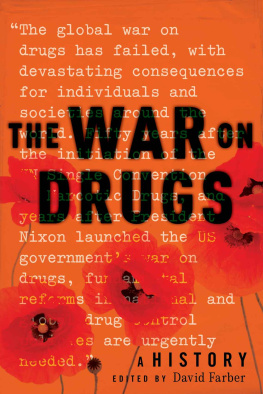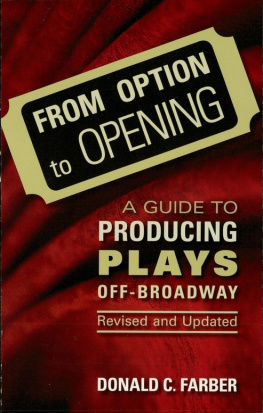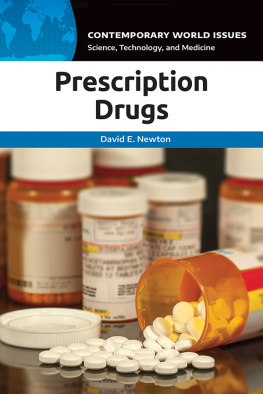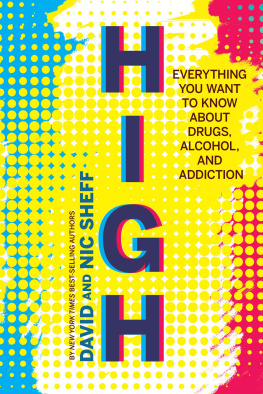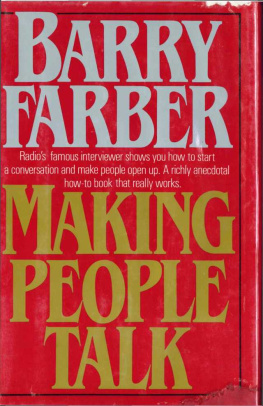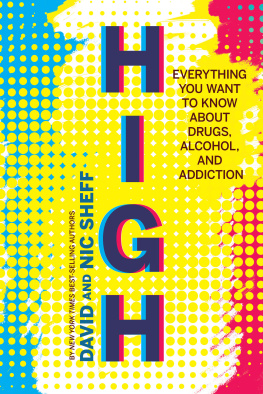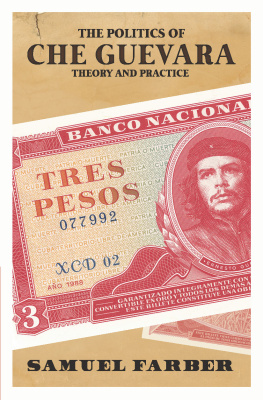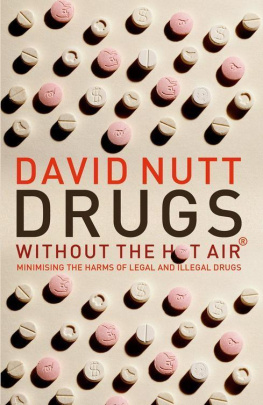David Farber - The War on Drugs
Here you can read online David Farber - The War on Drugs full text of the book (entire story) in english for free. Download pdf and epub, get meaning, cover and reviews about this ebook. year: 2021, publisher: NYU Press, genre: Politics. Description of the work, (preface) as well as reviews are available. Best literature library LitArk.com created for fans of good reading and offers a wide selection of genres:
Romance novel
Science fiction
Adventure
Detective
Science
History
Home and family
Prose
Art
Politics
Computer
Non-fiction
Religion
Business
Children
Humor
Choose a favorite category and find really read worthwhile books. Enjoy immersion in the world of imagination, feel the emotions of the characters or learn something new for yourself, make an fascinating discovery.
- Book:The War on Drugs
- Author:
- Publisher:NYU Press
- Genre:
- Year:2021
- Rating:5 / 5
- Favourites:Add to favourites
- Your mark:
- 100
- 1
- 2
- 3
- 4
- 5
The War on Drugs: summary, description and annotation
We offer to read an annotation, description, summary or preface (depends on what the author of the book "The War on Drugs" wrote himself). If you haven't found the necessary information about the book — write in the comments, we will try to find it.
The War on Drugs — read online for free the complete book (whole text) full work
Below is the text of the book, divided by pages. System saving the place of the last page read, allows you to conveniently read the book "The War on Drugs" online for free, without having to search again every time where you left off. Put a bookmark, and you can go to the page where you finished reading at any time.
Font size:
Interval:
Bookmark:
THE WAR ON DRUGS
The War on Drugs
A History
Edited by
David Farber

NEW YORK UNIVERSITY PRESS
New York
NEW YORK UNIVERSITY PRESS
New York
www.nyupress.org
2022 by New York University
All rights reserved
References to Internet websites (URLs) were accurate at the time of writing. Neither the author nor New York University Press is responsible for URLs that may have expired or changed since the manuscript was prepared.
Library of Congress Cataloging-in-Publication Data
Names: Farber, David R., editor.
Title: The war on drugs : a history / edited by David Farber.
Description: New York : New York University Press, [2021] | Includes bibliographical references.
Identifiers: LCCN 2021009013 | ISBN 9781479811359 (hardback) | ISBN 9781479811366 (paperback) | ISBN 9781479811427 (ebook) | ISBN 9781479811397 (ebook other)
Subjects: LCSH: Drug controlUnited StatesHistory. | Drug trafficUnited StatesHistory. | Drug abuseGovernment policyUnited StatesHistory.
Classification: LCC HV5825 .W3812777 2021 | DDC 364.1/770973dc23
LC record available at https://lccn.loc.gov/2021009013
New York University Press books are printed on acid-free paper, and their binding materials are chosen for strength and durability. We strive to use environmentally responsible suppliers and materials to the greatest extent possible in publishing our books.
Manufactured in the United States of America
10 9 8 7 6 5 4 3 2 1
Also available as an ebook
- David Farber
- David Farber
- David Farber
- Elaine Carey
- Michael Polson
- Peter C. Pihos
- Emily Dufton
- Lucas Richert, Erika Dyck, and Alexis Turner
- Aileen Teague
- James Bradford
- David Herzberg
- Kathleen Frydl
DAVID FARBER
Over the past fifty years, the United States government has spent over a trillion dollars fighting a War on Drugs. This massive budgetary expenditure and concomitant commitment to a fiercely punitive treatment of illegal drug users and sellers represents a major inflection point in Americans much longer campaign against the distribution and use of cocaine, cannabis, heroin, and a number of other targeted intoxicants. As this collection demonstrates, the scope, strategy, and tactics of that extraordinarily costly and punitive war have changed over time.
One near-constant, however, has been drug warriors relentless effort to criminalize people who sell or use illegal drugs. In recent years, about 1.5 million people have been arrested annually on drug chargesand most of these arrests involve cannabis. Nearly five hundred thousand Americans are currently incarcerated for drug offenses. Exactly which Americans authorities have chosen to imprison on drug charges is another piece of the story this collection offers. Suffice it to say here that Black Americans are almost six times more likely than white Americans to have been incarcerated on drug charges, even as white and Black Americans use drugs at about the same rate. Currently, the federal government expends well over $9 million every day, or well over $3 billion a year, to lock up drug offenders; states and localities, combined, pay far more.
Today, in part as a response to those human and financial costs, Americans are fast losing their faith that a War on Drugs is fair, moral, or sensible, let alone winnable. Recent surveys show that only about one in ten Americans believe that anyone should go to jail for possessing a small amount of marijuana. During the 2020 election campaign, erstwhile drug warrior extraordinaire President Joe Biden went further, arguing, No one should be incarcerated for drug use [of any kind]. He insisted that education, prevention, and redemptionnot incarcerationshould govern American drug policy.
At least one recent survey of American public opinion indicates that Bidens position has become a majoritarian one in the US. Fifty-five percent of those surveyed said that all drug offenses should be treated not as felonies but simply as civil offenses. In the words of the survey, such offenses would be treated like minor traffic violations rather than crimes. That newfound perspective, as this collection indicates, has been hard won, and it has yet to change fundamental aspects of the punitive drug regime that has long reigned in the US.
Even though the War on Drugs has lost a great deal of popular support, the sunk costs of the war continue to drive it forward. People increasingly worry about the financial and human cost of prisons larded with convicted non-violent drug offenders, but prison guard unions, police unions and fraternal organizations, private contractors, and other economic interests fight to keep the drug offendertoprison pipeline flowing. And after fifty years of successful drug-dependent state building, fiefdoms of drug-fighting agencies and organizations at every level of government insist on the continued need to maintain their institutional prerogatives, power, and funding. A great many voters, while increasingly uncomfortable with this fifty-year-long war arerightfullyanxious about what could and should replace it. These factors, and more, have made fundamental, let alone equitable, change in American drug policy an extraordinary political challenge.
In this collection, we examine how and why so many fought so hard to criminalize the use and sale of such a great variety of drugs. We also draw attention to those who fought both the logic and the punitive practices of the War on Drugs. Writing in this seemingly transformational moment, we also ponder what might replace this war. Should the model Americans use to regulate white market drugs expand to include currently illegal black market drugs? Could public health approaches further ameliorate drug addiction? Should legalization extend beyond cannabis to other drugs, such as cocaine and hallucinogenics? Ending the punitive War on Drugs, almost all reformers would agree, demands more than simply saying yes to all currently illegal drugs.
When President Richard Nixon launched the modern War on Drugs in 1971, few Americans believed that cannabis, let alone so-called hard drugs, should be legal or even decriminalized in the US. In 1969, 84 percent of Americans said they believed anyone caught with even the smallest amount of marijuana should go to jail. Users and dealers of hard drugs, Americans believed, demanded even greater punishment.
For decades, a broad political consensus that included liberal Democrats and conservative Republicans championed a mercilessly punitive War on Drugs. President Bill Clinton, just like President Ronald Reagan, signed legislation giving law enforcement authorities at all levels of government more resources and more incentives to lock up ever more Americans caught up in the distribution and possession of illegal drugs. The African American congressional representative Charles Rangel, whose district included Harlem, was as fierce an advocate of harsh treatment of drug offenders as any of his conservative white fellow members of Congress. For nearly half a century, tens of millions of Americans across social, economic, and political divides agreed that the War on Drugs was one of the USs good wars.
Of course, this conventional wisdom functioned in the breach. Americans continued to use illegal drugs, and to raise their voices against repression. In the mid-1970s, in the shadow of President Nixons declaration of an all-out offensive against drugs, a pro-cannabis coalition of mostly white, middle-class users, supported by makers of drug paraphernalia and not a few cannabis dealers, sought to decriminalize the possession of marijuana. They had some success in a few states and localesbefore a swelling wave of fearful parents, supported by a range of public health experts, turned the tide against them during the Reagan years. The federal effort to decriminalize cannabis was stopped in its tracks. Similarly, in the late 1970s, as cocaine use soared among a segment of the professional-managerial classyuppiessome politicians began to rethink the logic of the absolute criminal prohibition of that drug. The rise of crack cocaine in the mid-1980s, often distributed by so-called inner-city crews, put a stop to that reformist campaign.
Next pageFont size:
Interval:
Bookmark:
Similar books «The War on Drugs»
Look at similar books to The War on Drugs. We have selected literature similar in name and meaning in the hope of providing readers with more options to find new, interesting, not yet read works.
Discussion, reviews of the book The War on Drugs and just readers' own opinions. Leave your comments, write what you think about the work, its meaning or the main characters. Specify what exactly you liked and what you didn't like, and why you think so.

